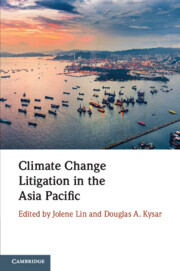Book contents
- Climate Change Litigation in the Asia Pacific
- Climate Change Litigation in the Asia Pacific
- Copyright page
- Contents
- Figures
- Tables
- Contributors
- Foreword
- Abbreviations
- Introduction
- Part I Theoretical Underpinnings and Implications of Climate Change Litigation
- Part II International Law and International Adjudication
- 3 Using Human Rights Law to Address the Impacts of Climate Change: Early Reflections on the Carbon Majors Inquiry
- 4 Litigating Human Rights Violations Related to the Adverse Effects of Climate Change in the Pacific Islands
- 5 The Potential for UNCLOS Climate Change Litigation to Achieve Effective Mitigation Outcomes
- 6 Investor-State Dispute Settlement in Renewable Energy: Friend or Foe to Climate Change?
- Part III Domestic Law and Domestic Adjudication
- Part IV China, Courts and Climate Change
- Index
5 - The Potential for UNCLOS Climate Change Litigation to Achieve Effective Mitigation Outcomes
from Part II - International Law and International Adjudication
Published online by Cambridge University Press: 06 November 2020
- Climate Change Litigation in the Asia Pacific
- Climate Change Litigation in the Asia Pacific
- Copyright page
- Contents
- Figures
- Tables
- Contributors
- Foreword
- Abbreviations
- Introduction
- Part I Theoretical Underpinnings and Implications of Climate Change Litigation
- Part II International Law and International Adjudication
- 3 Using Human Rights Law to Address the Impacts of Climate Change: Early Reflections on the Carbon Majors Inquiry
- 4 Litigating Human Rights Violations Related to the Adverse Effects of Climate Change in the Pacific Islands
- 5 The Potential for UNCLOS Climate Change Litigation to Achieve Effective Mitigation Outcomes
- 6 Investor-State Dispute Settlement in Renewable Energy: Friend or Foe to Climate Change?
- Part III Domestic Law and Domestic Adjudication
- Part IV China, Courts and Climate Change
- Index
Summary
Climate change litigation has, to date, largely been limited to the domestic legal sphere due to the lack of binding dispute settlement procedures in international climate change treaties and agreements. Yet, it is the oft-stated and unfortunate reality that the states which have contributed the least to the causes of climate change are often those that are already and will continue to feel its effects most harshly. Unlike the prominent climate change instruments such as the UNFCCC or the Paris Agreement, the UNCLOS contains compulsory binding third party dispute settlement procedures. Therefore, this article looks at the extent to which UNCLOS can be relied upon, and its role as an alternative approach for disproportionately affected states to achieve effective global mitigation outcomes. Instinctively, the UNCLOS may not be the first port of call for climate change litigators and activists, since it was designed primarily to govern issues of the law of the sea. However, there are provisions within UNCLOS which regulates all forms of pollution that harm the marine environment, and therefore encompasses climate change causes and effects.
- Type
- Chapter
- Information
- Climate Change Litigation in the Asia Pacific , pp. 120 - 143Publisher: Cambridge University PressPrint publication year: 2020



